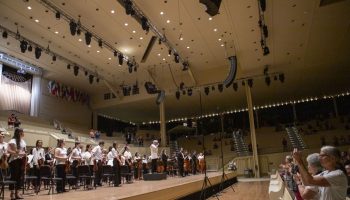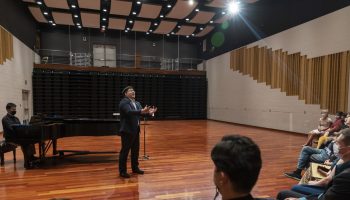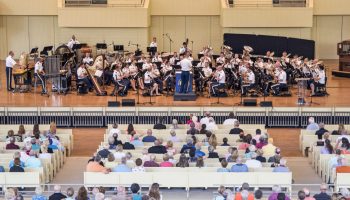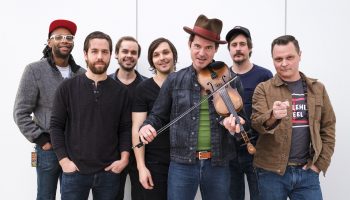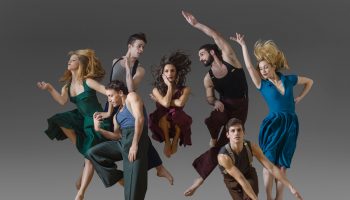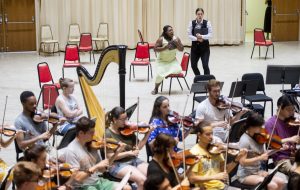
Star-crossed lovers will sing beneath the stars tonight when a classic operatic story of young romance, blood feuds and tragedy whirls across the Amphitheater stage.
At 8:15 Monday, August 5 in the Amp, the Music School Festival Orchestra will join forces with a cast of School of Music Voice Program students to put on Vincenzo Bellini’s opera I Capuleti e i Montecchi (The Capulets and the Montagues).
The opera is based on the story of Romeo and Juliet — not the Shakespeare version, but the original tale that both Shakespeare and Bellini were inspired by. As such, the core conflict of the story remains more or less the same, but the opera has some significant differences from the play most people know.
The opera is in Italian, but translations of the lyrics will be projected above the stage during the performance.
“It’s very exciting for (the students) to sing with orchestra, because at their age a lot of the students don’t get that opportunity — or at least not very much,” said Donna Gill, head voice coach and coordinator of voice scheduling. “And I think it’s good for the orchestra to do something like an opera — vocal music.”
One interesting aspect of the opera is that the part of Romeo is meant to be played by a woman in the lowest voice range; the part was originally cast this way because it was once common to cast women in the low range as young men, so that they sounded both masculine and youthful. In this production, mezzo-soprano Marie Engle has the role of Romeo — and it is not her first time playing a man.
“It’s a really, really tricky role because it’s very high, … but it also has a lot of low notes,” Engle said.
Though voice students have had many opportunities this summer to perform in recitals, doing a full opera presents the opportunity of singing as a character and following the evolution of that character throughout the entire story.
“You see this duality of (Romeo) in that he’s both a raging man who’s all about violence and bloodlust, and then you have that opposite side of him that is very tender and loving and caring and not afraid to cry,” Engle said.
For the vocalists, it is a rare chance to perform in a space as large as the Amp — which has over 2,500 more seats than the Metropolitan Opera House in New York City — and to sing with the force of a full orchestra in the pit.
“Singing with an orchestra compared to singing with a piano is infinitely different,” said tenor Matthew Pearce, who will be playing the role of Tebaldo. “To feel that amount of power behind you as you sing, … that helps supply so much to the singing.”
One of the biggest challenges this production has faced is the time crunch: The vocalists have only been rehearsing together for a couple of weeks, and the MSFO had less than a week to put together a program that has as much music as two of their regular concerts.
The MSFO played parts of Sergei Prokofiev’s ballet “Romeo and Juliet” at a performance earlier this season, but Timothy Muffitt, conductor of the MSFO and artistic director of the Instrumental Program, said that Bellini’s opera is “on the opposite end of the spectrum.” Whereas Prokofiev’s ballet puts the bulk of the emotional heavy-lifting in the orchestra, Bellini gives the vocalists that responsibility and it is the role of the orchestra to support that.
Because of those roles, Muffit said, the orchestra’s approach to an opera is different than an instrumental-only concert. When conducting, Muffitt has to remain flexible and react to what the singers are doing on stage; the orchestra is less precise and more focused on aligning with the vocalists’ musical decisions. This is something that is important for the students, as pre-professionals, to learn, Muffitt said.
“In this opera, the singers are given a lot of space to do what they want with the music,” Engle said.
I Capuleti e i Montecchi is a bel canto opera; this phrase translates to “beautiful song,” and is a type of singing that tends to be flowing, lyrical and focused on the beauty of the music. It is more about finesse and fluidity than, for example, the verismo style, which is more about the magnitude and power of the voice.
“The arias have a lot more showy aspects to them,” Pearce said. “(There is) lot of moving of the voice and a lot of singing of high notes and holding them forever, just because it’s a good chance to show off.”
There are a lot of long, colorful phrases for both the singers and the orchestra; several instruments, like cello and horn, get plenty of chances for solos, Muffitt said.
“Doing an opera is always exciting,” Muffit said.
Though in many ways it is a story that many have heard before, Engle said that the tragedy of Romeo and Juliet may still have something to teach modern audiences about the dangers of polarization and the importance of listening.
“I think one of the main points that we’re trying to get at is, if people just continue to fight and fight and violence is sort of the go-to solution, what love there is will die,” Engle said.
I Capuleti e i Montecchi is short for an opera — only about two hours. Still, it is a test of stamina and endurance for the students involved. Tonight’s show will be their only performance of this opera.

